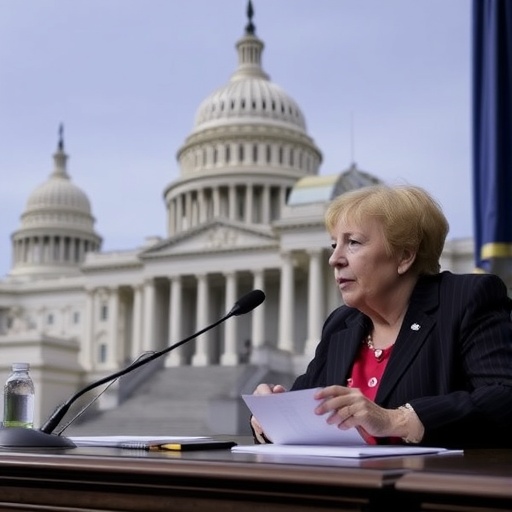Breaking Down New York Senators’ Voting Records: Key Congress Decisions This Week Ending October 24
In a week packed with high-stakes debates on everything from climate resilience to economic recovery, New York’s Democratic senators, Chuck Schumer and Kirsten Gillibrand, cast pivotal votes that could shape the Empire State’s future. Their decisions on major legislation in Congress highlighted a blend of party-line solidarity and nuanced stances on pressing national issues, drawing sharp attention from voters amid the ongoing political turbulence.
- Schumer and Gillibrand Back Bipartisan Infrastructure Boost for Flood-Prone Regions
- Gillibrand Leads Charge on Women’s Health Funding Amid Partisan Divide
- Senators Clash with GOP on Immigration Reform Over Border Security Measures
- Economic Relief Bill Sees Full Support from NY Delegation on Inflation Controls
As Senate Majority Leader, Schumer steered several bills through the chamber, while Gillibrand advocated fiercely for women’s rights and environmental protections. This week’s voting record offers a window into their priorities, revealing how they balanced New York’s urban density needs with broader national politics. With the midterm elections looming, these votes are more than procedural—they’re a litmus test for constituents demanding action on inflation, housing, and public health.
Schumer and Gillibrand Back Bipartisan Infrastructure Boost for Flood-Prone Regions
The week’s most unifying vote came on the Resilient Communities Infrastructure Act (RCIA), a $50 billion bipartisan package aimed at fortifying infrastructure against climate-driven disasters. Both New York senators voted ‘yes’ on October 22, championing provisions that allocate $12 billion specifically for Northeast coastal protections—a direct boon for New York City’s subway systems and Hudson Valley flood barriers.
Schumer, in a floor speech, emphasized the urgency: “New Yorkers know all too well the devastation of Superstorm Sandy. This legislation isn’t just funding; it’s a lifeline for families rebuilding after every hurricane season.” Data from the U.S. Geological Survey supports this, showing that New York has faced over 200 flood events since 2010, costing taxpayers $15 billion in damages. Gillibrand echoed the sentiment on her Twitter feed, stating, “From Brooklyn bridges to upstate dams, we’re investing in resilience to protect our communities from the climate crisis.”
This vote marks a rare moment of cross-aisle cooperation in a polarized Congress. Republicans like Sen. Susan Collins of Maine joined the 68-32 tally, praising the bill’s focus on job creation—projected to generate 150,000 positions nationwide, with 20,000 earmarked for New York laborers. Critics, however, including fiscal hawks from the Freedom Caucus, decried it as “pork-barrel spending,” arguing that the bill’s green energy mandates inflate costs by 15%.
For New York politics, this alignment underscores the senators’ commitment to state-specific legislation. Schumer’s leadership role amplified the bill’s passage, potentially securing federal matching funds for the MTA’s $19 billion capital plan. As one policy analyst from the Brookings Institution noted, “This vote cements New York’s senators as infrastructure champions, but it also tests their ability to deliver amid budget gridlock.”
Gillibrand Leads Charge on Women’s Health Funding Amid Partisan Divide
Shifting to social policy, Kirsten Gillibrand took center stage with her ‘yes’ vote on the Women’s Health Equity Act (WHEA) on October 20, a comprehensive bill expanding access to reproductive and maternal care. Schumer joined her in support, contributing to a 55-45 passage that now heads to the House. The legislation allocates $8 billion over five years for rural clinics and postpartum support, addressing New York’s stark disparities—where Black maternal mortality rates are three times higher than white rates, per CDC statistics.
Gillibrand, a longtime advocate, shared a personal anecdote during debate: “I voted yes because I’ve seen firsthand how barriers to care devastate families in my home state. This is about equity, not ideology.” The bill includes mandates for insurance coverage of fertility treatments and doula services, responding to a 2023 Kaiser Family Foundation report that found 40% of New York women delay care due to costs.
Not all votes were unanimous, however. While Schumer’s support was steadfast, the measure exposed rifts in Congress, with 10 Democrats, including Sen. Joe Manchin of West Virginia, abstaining over concerns about federal overreach. Manchin cited, “We need targeted aid, not blanket spending that balloons the deficit.” This internal party tension highlights the delicate politics of progressive priorities in a slim-majority Senate.
In the context of New York senators’ voting records, this move bolsters Gillibrand’s profile on women’s issues, especially post-Roe v. Wade. Advocacy groups like Planned Parenthood lauded the vote, estimating it could reduce unintended pregnancies by 25% in underserved areas. Yet, with House Republicans vowing to block it, the bill’s fate hangs in balance, pressuring Schumer to rally more bipartisan backing.
Senators Clash with GOP on Immigration Reform Over Border Security Measures
Immigration emerged as a flashpoint on October 23, when Schumer and Gillibrand both opposed the Secure Borders Enhancement Act (SBEA), a Republican-led bill tightening asylum rules and expanding detention facilities. Their ‘no’ votes contributed to its 48-52 defeat, preserving pathways for Dreamers and refugees—a stance rooted in New York’s status as a sanctuary state hosting over 200,000 undocumented immigrants.
Schumer, defending the position, argued on the Senate floor: “This isn’t security; it’s cruelty. New York’s economy thrives on immigrant labor, from farms to tech startups.” Economic data backs this: A 2022 study by the Fiscal Policy Institute found immigrants contribute $100 billion annually to New York’s GDP. Gillibrand added, “We’ve turned away families fleeing violence; that’s not American values.”
The vote’s partisan lines were stark, with all Republicans in favor and only two GOP senators breaking ranks. Proponents of SBEA, like Sen. Ted Cruz, claimed it would reduce illegal crossings by 30%, citing Border Patrol figures of 2.5 million encounters in fiscal 2023. Opponents countered that such measures exacerbate humanitarian crises, pointing to Amnesty International reports of overcrowded facilities.
This decision in Congress reflects the broader politics of New York senators, who represent a diverse electorate including large Hispanic communities in Queens and the Bronx. It also signals ongoing gridlock on comprehensive reform, with Schumer promising a Democratic alternative next session focused on citizenship paths. For constituents, the vote means continued uncertainty for mixed-status families, fueling debates in local politics.
Economic Relief Bill Sees Full Support from NY Delegation on Inflation Controls
Addressing pocketbook concerns, both senators voted affirmatively on the Inflation Reduction and Family Support Act (IRFSA) on October 24, extending tax credits and capping drug prices. Passed 60-40 after a cloture vote, the bill builds on 2022’s Inflation Reduction Act, aiming to save middle-class families $1,200 yearly through enhanced child tax credits.
New York’s angle is acute: With inflation at 4.5% statewide (per BLS data), the legislation targets high-cost areas like NYC, where rent averages $3,500 monthly. Schumer hailed it as “a win for working New Yorkers,” noting provisions for affordable housing subsidies that could unlock 50,000 units. Gillibrand focused on pharmaceuticals: “Seniors in Buffalo shouldn’t choose between meds and meals.” The AARP estimates the price caps will benefit 1.5 million New Yorkers on Medicare.
While bipartisan in passage, amendments sparked debate—Democrats rejected GOP pushes for oil drilling expansions, prioritizing green incentives instead. Energy economists from Columbia University project the bill could lower household energy bills by 10% via renewable rebates.
This voting record entry showcases the senators’ economic focus, aligning with New York politics where 60% of voters prioritize cost-of-living issues (Quinnipiac poll). It positions them as defenders against recession fears, though skeptics warn of implementation delays.
Looking ahead, these votes set the stage for intensified lobbying in the lame-duck session. Schumer’s agenda includes advancing stalled bills on voting rights and gun safety, while Gillibrand eyes international women’s rights pacts. For New Yorkers, the implications are profound: Stronger infrastructure could mitigate climate risks, health reforms address equity gaps, and economic measures ease financial strains. As Congress recesses, constituents watch closely, knowing these decisions ripple into 2024’s electoral battles and beyond. With potential Supreme Court challenges and House dynamics shifting, the senators’ records will face scrutiny, urging them to bridge divides for lasting legislative wins.








